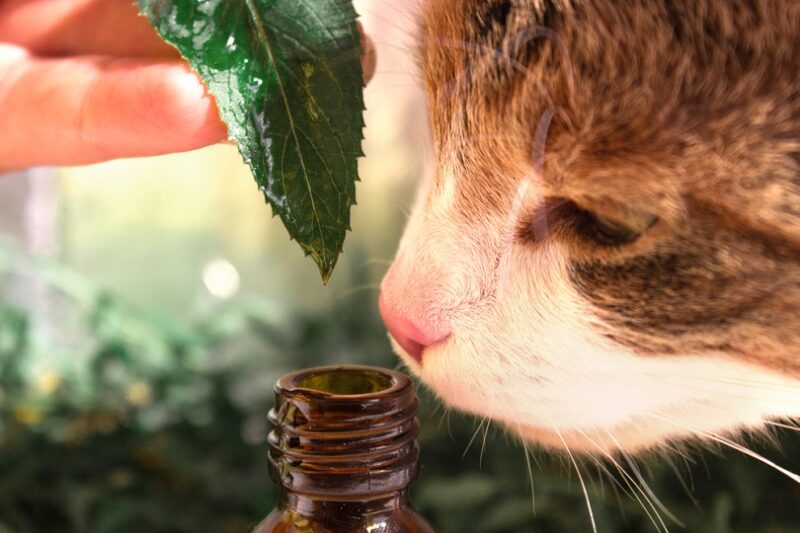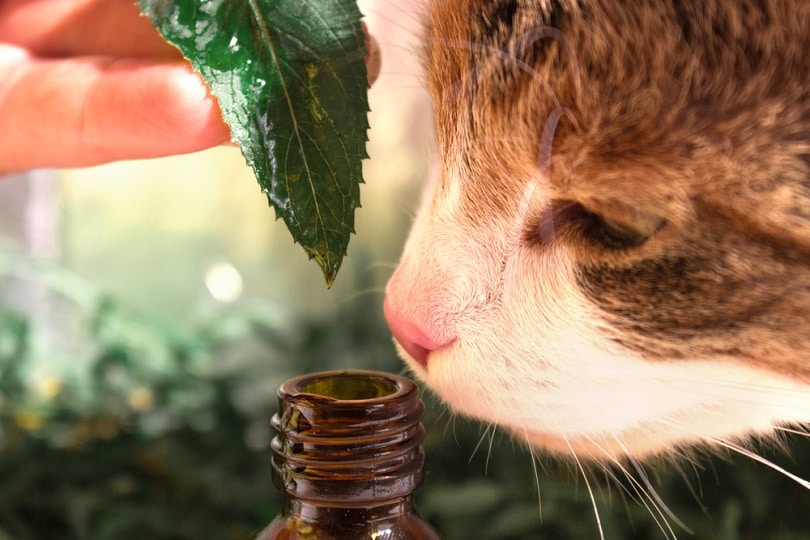
If you love to use essential oils for yourself, then you may like the idea of using them for your cat too. Before you do, we recommend that you read this article first! As cat owners, we already know that our feline friends can be quite sensitive, but when it comes to using essential oils around cats, extreme caution is needed.
While some essential oils are safe for use around cats, others can cause severe problems. Cats cannot metabolize or break down the compounds that some essential oils contain, so they can cause toxicity if not used very carefully.
In this list, we rounded up the four best essential oils for cats. Before you use any of them, though, be sure to read our buyer’s guide too!
It’s important to remember that some essential oils can be extremely toxic to your cat. Different essential oils can be used in different ways in and around your home. If you’re not sure how to use an oil, it’s best to err on the side of caution and speak to your vet before using any essential oils around your cat.
A Quick Comparison of Our Favorites in 2024
| Image | Product | Details | ||
|---|---|---|---|---|
| Best Overall |
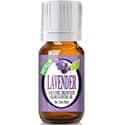
|
Healing Solutions Lavender Essential Oil |
|
CHECK PRICE |
| Best Value |
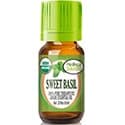
|
Healing Solutions Sweet Basil Essential Oil |
|
CHECK PRICE |
| Premium Choice |
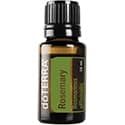
|
doTERRA Rosemary Essential Oil |
|
CHECK PRICE |
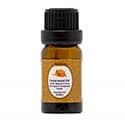
|
Wood Smith U.S.A. Cedarwood Essential Oil |
|
CHECK PRICE | |
The 4 Best Essential Oils for Cats
1. Healing Solutions Lavender Essential Oil — Best Overall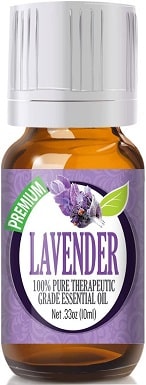
If you’re looking for a safe essential oil to use around your cat, then we recommend the Healing Solutions Lavender Essential Oil as the best overall essential oil for cats. Lavender can have a calming and relaxing effect and can be used to help your cat relax after a stressful vet visit or help them stay calm when there are fireworks or other loud noises. It has a sweet and fresh floral scent, with a slight woody undertone.
Every batch of this oil is tested for purity using a process called “GC/MS.” This stands for Gas Chromatography/Mass Spectrometry; only the finest oils that pass the quality standards required are used. This 10 ml bottle includes a dispensing eyedropper integrated into the cap to make pouring and application easy. If you need more oil, you can also buy this in bottle sizes of 1, 2, and 4 fluid ounces.
- Choose from four bottle sizes
- Bottled in the U.S.A.
- Therapeutic grade oil
- Great value for money
- Smell can be inconsistent between batches
2. Healing Solutions Sweet Basil Essential Oil — Best Value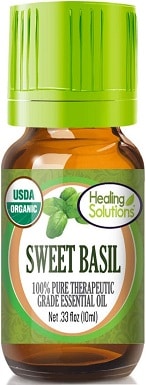
If you’re looking for the best essential oil for cats for the money, then the Healing Solutions Sweet Basil Essential Oil is our suggestion. This USDA-certified organic oil is frequently tested for purity, with the laboratory results available publicly.
Sweet Basil is antibacterial, antifungal, and antiviral. It can be used as an air freshener, to help chase away stubborn odors from litter boxes. It can also be well diluted to help heal cuts and minor scrapes. It can help relieve tension and stress, so it can be good to use if you have a house move, vet visit, or other event coming up that may be stressful for your cat.
- Good value for money
- Pleasant smell
- USDA-certified organic
- Bottle includes easy-to-use dropper
- Only available in one bottle size
3. doTERRA Rosemary Essential Oil — Premium Choice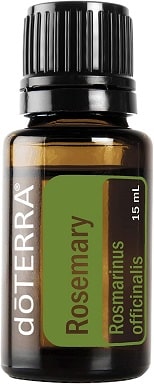
If you’re looking for a premium choice essential oil to treat your cat with, then the doTERRA Rosemary Essential Oil is the obvious choice. Rosemary can be used as a bath additive to help control fleas. A rinse made with one to two drops of rosemary essential oil mixed into a jug of water can be used after your cat’s bath and left without being rinsed off.
This high-quality oil is steam distilled from the leaves and flowers of the Rosemarinus officinalis plant. doTERRA Rosemary essential oil is a high-quality, premium-grade oil made with responsibly sourced rosemary, which is thoroughly tested for purity. Each doTERRA bottle has a batch code on the bottom, and you can use this to check the purity of your oil online.
- Every batch is tested for quality
- Kosher certified
- Bottled in the U.S.A.
- Helps repel fleas
- Lasts a long time
- Expensive
- Only available in one bottle size
4. Wood Smith U.S.A. Cedarwood Essential Oil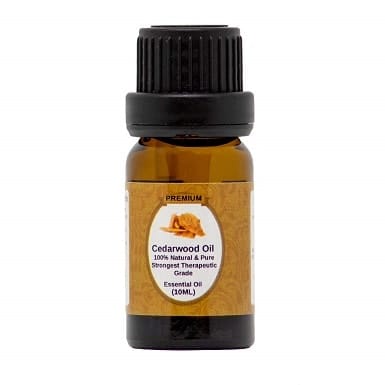
Cedarwood is another safe essential oil for cats, as long as it’s used correctly. This 10 ml bottle contains 100% natural and pure cedarwood oil at the strongest therapeutic grade. This cedarwood oil is sourced from Texas and bottled in the U.S.A. Cedarwood oils with the phenols removed, such as this one, are safe for cats, but if you’re looking at an alternative brand, you’ll need to make sure the phenols are removed.
Cedarwood is favored by some cat owners. Besides offering stress relief, it can also be used as a flea repellent. Try adding a couple of drops to your cat’s bath if you’re treating them for fleas or wiping a drop onto their collar to make them less attractive to fleas. Cedarwood oil can also be used around the house to stop flea eggs from hatching. Simply mix 10 drops into a spray bottle with equal parts white vinegar and water.
- 100% pure and natural
- Bottled in the U.S.A.
- Steam distilled for purity
- Made from Texan cedar trees
- Some cats can find small off-putting
- No laboratory test results available
Buyer’s Guide: Finding the Best Essential Oils for Cats
If you’re curious about using essential oils around your cat, make sure you read this buyer’s guide first! Using any essential oils around your cat should be undertaken with caution and always in conjunction with advice from your vet. Just because a product is a natural botanical extract, that doesn’t necessarily mean it’s safe to use around your cat.
What Are Essential Oils?
Essential oils are natural compounds that give individual plant species their distinctive scents. These volatile organic compounds can be extracted to form a concentrated substance. Essential oils are thought to be useful in a range of situations, from repelling insects and improving concentration to simply making your home smell nice.
Essential oils are not regulated by the FDA and are considered a complementary therapy. Before deciding to use essential oils on or around your cat, we highly recommend consulting with their vet first.
Why Can Essential Oils Be Dangerous for Cats?
Essential oils can rapidly be absorbed through both your skin and your cat’s skin. While the enzymes in the livers of humans can effectively metabolize and break down these compounds, cats lack this same ability. This means their bodies cannot break down certain substances found in some essential oils, such as phenols and terpenes. These can then build up in their bodies and quickly cause toxicosis.
We all know that cats love to keep themselves clean, and this grooming can put them at higher risk of accidentally ingesting essential oils. If the droplets from a diffuser settle on their fur or you pet your cat after handling essential oils yourself, then your cat may ingest the oils when they groom themselves.
Young kittens and older cats with liver diseases may be more at risk from the effects of essential oils than most other cats. In these cases, we would advise against the use of any essential oils around your cat.
The ASPCA lists essential oils as one of the 16 most commonly reported toxicological causes of muscle tremors in cats.
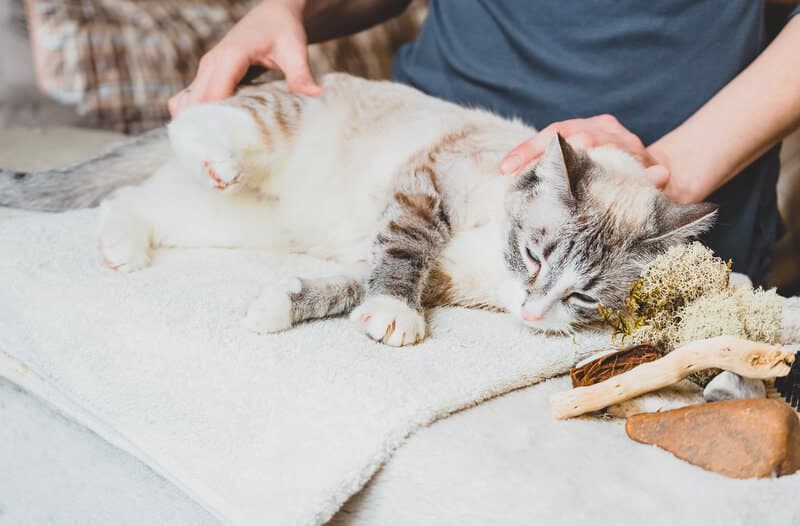
Symptoms of Essential Oil Poisoning
Even if you’re using an essential oil that should be safe around cats, it’s a good idea to familiarize yourself with the symptoms of essential oil poisoning in cats.
- Difficulty breathing
- Drooling
- Lethargy or weakness
- Muscle tremors
- Vomiting
- Hypothermia
- Depression
- Diarrhea
- Redness on the lips, gums, skin, or tongue
- Uncoordinated gait
- Pawing at the face
If you think that your cat has been exposed to or has ingested an essential oil that isn’t deemed safe, immediately call your vet or the Pet Poison Helpline.
Even exposure to high concentrations of the limited number of essential oils that are deemed safe for cats can cause problems. For example, if you dropped a bottle of essential oil on the floor and your cat walked through the spilled oil, you would need to watch for signs that this has affected them. We would recommend calling your vet to be on the safe side.
How to Use Essential Oils Around Cats
Never apply undiluted essential oils to your cat’s skin. Essential oils aren’t regulated by the FDA, and while some manufacturers will test each batch for purity, others may not. This means the quality, formulation, and chemical makeup of different essential oil brands can vary wildly. The same essential oil from two different brands may have very different compositions.
You can create a diluted essential oil rinse using the essential oils that we recommended on the list, but we always recommend discussing this with your vet first. For example, rosemary essential oil can be used as a rinse to help prevent against fleas.
One of the safest ways to use essential oils in your home is to diffuse them in an area that your cat cannot access. If your cat does have access to the area where your diffuser is located, make sure to place it somewhere safe where they can’t knock it over or access bottles of oil.
Passive diffusers, like candle burners, reed diffusers, or plug-in diffusers, are safer because they don’t disperse oil micro-droplets into the air. Active diffusers, like ultrasonics or nebulizers, do release micro-droplets of essential oils, however, so the chances of these coming into contact with your cat’s skin and fur are higher, as is the chance of them inhaling the droplets.
If your cat has breathing difficulties or a respiratory condition, then it may be safest to avoid the use of essential oils in areas of the home that they regularly use.
Remember that cats have a far stronger and more sensitive sense of smell than we do. What smells pleasantly subtle to you may be overwhelming to your cat.
If you’ve never used essential oils around your cat, then we recommend diffusing a very low concentration for a short amount of time and doing so in an area that your cat can freely leave if they choose to do so.
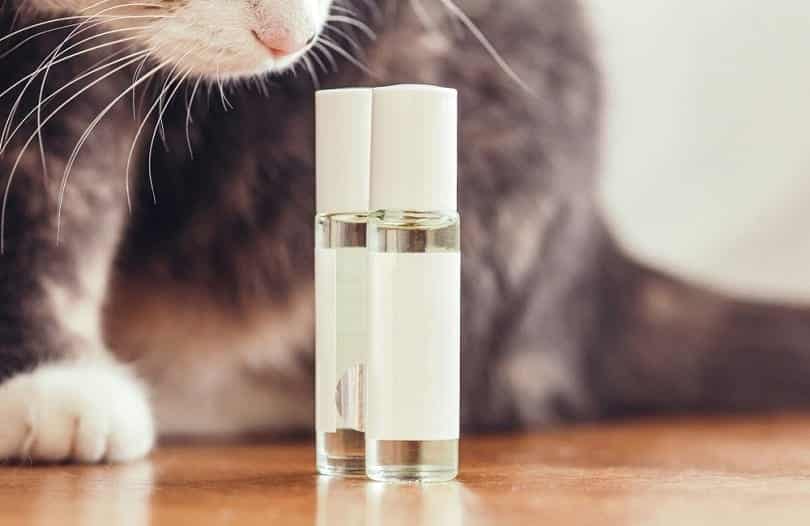
Which Essential Oils to Avoid
Some essential oils are very toxic to cats.
- Clove
- Cinnamon
- Eucalyptus
- Pine
- Sweet birch
- Wintergreen
- Ylang ylang
- Citrus oils
- Peppermint
- Tea tree (melaleuca)
- Thyme
- Oregano
- Pennyroyal
Some essential oils, including tea tree oil, can cause significant problems for cats with as few as eight drops. There are studies about owners who applied this dermally to their cats, in good faith that it would heal skin conditions as it does in humans. Sadly, toxicosis in cats can be the result.
 Conclusion
Conclusion
Essential oils can be useful in and around our homes, but caution is needed when using these concentrated extracts around your cat. If you’re looking for a safe oil for household use, we recommend the Healing Solutions Lavender Essential Oil. This can help relieve stress, but it should only be used in very diluted concentrations or diffused for a short amount of time.
In terms of best value, the Healing Essentials Sweet Basil Essential Oil is a great choice. This USDA-certified organic oil has plenty of applications in a cat-owning household, including as an air freshener and antibacterial cleaner.
We know that using essential oils safely around your cats can feel like a challenge. But with simple safety precautions, including choosing the right types of oil, there’s no reason that you can’t use essential oils around your house. Hopefully, our reviews have helped you figure out good options to start with. We do always recommend speaking to your vet before using any essential oils around your cat.
Featured Image Credit: Sinfebeth, Shutterstock


